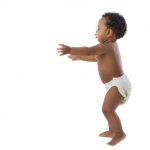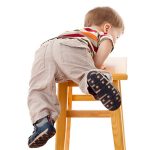 Exploration of all kinds continues to expand during this month as most children can cruise around using furniture for support. Some children will be able to explore while walking, although probably in an unstable fashion.
Exploration of all kinds continues to expand during this month as most children can cruise around using furniture for support. Some children will be able to explore while walking, although probably in an unstable fashion.
This is a month of movement and experimentation for little ones – with their bodies, hands and behaviors. Once they are holding an object, you might see them learning about it through a combination of repetition and trial-and-error. It is completely normal to see a child turning an object around and around, feeling each side, touching it to different parts of the body. This is all an attempt to learn through touching. The idea of experimentation also extends to testing new behaviors. For example, children will try to learn how their parents react if they throw toys or food on the floor…over and over again!
During this time children are also “learning to learn” through direct imitation – trying to replicate sounds, facial expressions and behaviors that they observe around them. This ability will continue to develop for a long time and will be a fundamental part of their learning process.
Fine motor skills develop in several ways. If children are allowed to experiment with crayons and paper, they may make small scribbles. Also, if you help them at first (and then let them practice), they may use a spoon to feed themselves thick foods such as fruit purees.
You may also see an increase in language use – both verbal and body language – as a way to communicate a need or simply to get your attention.








